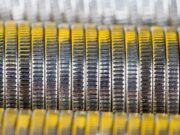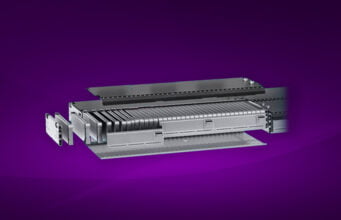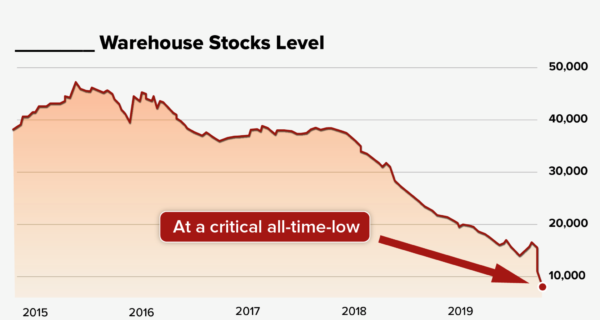The right stocks can make you rich and change your life.
The wrong stocks, though… They can do a whole lot more than just “underperform.” If only! They can eviscerate your wealth, bleeding out your hard-won profits.
They’re pure portfolio poison.
Surprisingly, not many investors want to talk about this. You certainly don’t hear about the danger in the mainstream media – until it’s too late.
That’s not to suggest they’re obscure companies – some of the “toxic stocks” I’m going to name for you are in fact regularly in the headlines for other reasons, often in glowing terms.
I’m going to run down the list and give you the chance to learn the names of five companies I think everyone should own instead.
But first, if you own any or all of these “toxic stocks,” sell them today…
Run for Your Financial Life
Toxic Stock No. 1: There’s not a more perfect example of a “stay-away” play than Planet Fitness Inc. (NYSE: PLNT). The company went public in the summer of 2015, but it’s been around since 1992, and it commits the cardinal sin of longtime public companies: It loses money.
You know, everyone should work out. And I’m betting that maybe you’ve thought about joining Planet Fitness because its monthly dues are so cheap. But all you have to do is look at Planet’s revenue to see how “successful” the company’s business model has been.
I’ll even make a second wager here: When you look at Planet’s $6.7 billion market cap and see that its revenue over the past 12 months was… only $345 million, you’ll be shocked. That’s not a lot of revenue for a company with thousands of gyms and thousands of customers – especially when it can pump up its sales by selling gym equipment to franchise owners.
Exacerbating that skimpy revenue is the fact that Planet Fitness lost more than $18 million over the past year. Maybe that has something to do with its negative profit margin, or the firm’s almost-$2 billion debt. But just looking at the thin revenue after being around all these years tells you this is a toxic stock.
Sell this “go-nowhere” venture’s stock.
[stock_market_widget type=”accordion” template=”info” color=”#9C660A” assets=”PLNT” start_expanded=”false” api=”yf”]
Toxic Stock No. 2: One of the most overly hyped stocks actually had a good run… for about a minute. I’m talking about Grubhub Inc. (NYSE: GRUB). After going public in 2014, the stock caught fire in 2018 and took off like a rocket. And that’s when the hype became positively deafening. Then, just as fast as Grubhub rose, it crashed right back to earth. Of course, the hype machine revved up again around the pandemic because everyone was having food delivered, and that’s what Grubhub does. And so the stock, driven by hype, rocketed anew.
But all hype is fleeting… and Grubhub’s revenue has already slowed, because there’s more competition in the space and it charges more than its rivals – and because customers are starting to realize Grubhub is soaking the restaurants people love to order from. The stock is toxic, plain and simple. You can see it in the company’s faltering earnings growth and in the stock’s lackluster performance. The overhyping is a trap. Sell this hype-train rider.
[stock_market_widget type=”accordion” template=”info” color=”#9C660A” assets=”GRUB” start_expanded=”false” api=”yf”]
Toxic Stock No. 3: The posterchild of toxic stocks here is Vornado Realty Trust (NYSE: VNO), the real estate investment trust (REIT). REITs have to pass through at least 90% of their funds from operations to shareholders as dividends, and VNO’s attractive 4.64% dividend yield is pretty sweet. Or, it is until you look at how much money Vornado makes, and you find out the REIT is actually losing money.
In the last 12 months, on revenue of more than $1.56 billion, Vornado actually lost more than $349 million. So, how is the company paying that big, fat dividend? The company is borrowing money, that’s how. That means Vornado’s mountain of debt – nearly $8 billion worth – will only keep rising. That also means at some point, the dividend will be in jeopardy.
This stock may look good because of its dividend. But good luck getting past that growing pile of debt. It’s a toxic REIT. Unload this debt bomb before its execs are forced to slash the dividend.
[stock_market_widget type=”accordion” template=”info” color=”#9C660A” assets=”VNO” start_expanded=”false” api=”yf”]
Toxic Stock No. 4: If the investment sheriff created “Wanted” posters for the crooked players in the stock market, one of the “most wanted” would be Luckin Coffee Inc. (OTC: LKNCY) – the so-called “Starbucks of China.”
We all expected a sensational Starbucks-like story of zooming revenue and profits and a soaring stock price… come to find out Luckin was all wrong about its revenue – and not wrong by accident, wrong by fraud.
How much did the darling company misrepresent revenue growth by? How about by 100%, according to a class-action lawsuit filed on behalf of a couple of pension funds.
When companies don’t play by the rules, invent their own rules, or just flat-out cheat – you’re looking at a toxic firm. Always dump a scammer. Luckin fits the bill.
[stock_market_widget type=”accordion” template=”info” color=”#9C660A” assets=”LKNCY” start_expanded=”false” api=”yf”]
Toxic Stock No. 5: Investors are always talking about “best-in-breed” companies. Then there’s the opposite… the also-ran. The specific one I’m thinking about here is RE/MAX Holdings Inc. (NYSE: RMAX), which you definitely know, and probably either own or are thinking about buying.
Don’t do it.
RE/MAX, which has been around for years, took in only $268 million in revenue over the last 12 months, unconscionable for a real estate firm amid the hottest housing market since 2005. Compare that with Zillow Group Inc. (NASDAQ: Z), which had $3.43 billion in revenue – making RE/MAX look pretty lame.
I don’t care that RE/MAX made a little money – because at a profit margin of 1.55%, we’re not just talking “little,” but actually “microscopic.”
I also don’t care that RE/MAX’s balance sheet and cash flow metrics are all in good shape. The company’s going nowhere. Did I mention this the hottest housing market in years? RE/MAX is toxic – end of story. Dump this also-ran.
[stock_market_widget type=”accordion” template=”info” color=”#9C660A” assets=”RMAX” start_expanded=”false” api=”yf”]
Toxic Stock No. 6: Everyone knows a few hot gambling stocks, and most people assume they’re all hot because gambling is hot. Not this one, though; Esports Entertainment Group Inc. (NASDAQ: GMBL) isn’t a hot company, and betting on its stock is nothing but pure, wrongheaded gambling.
In fact, it’s beyond a long shot. The odds are against you here – way against you – because this company took in miniscule revenue of less than $8 million… while it lost almost $20 million over the last 12 months. That’s a whopping negative 246% profit margin for the folks keeping score.
Not all gambling stocks are hot, and this one’s a bad bet. Sure, you’ve got to know when to hold ’em, but, as a wise gambler once said, “you’ve got to know when to fold ’em,” too – and that’s just what you should do if this stock’s in your “hand.”
[stock_market_widget type=”accordion” template=”info” color=”#9C660A” assets=”GMBL” start_expanded=”false” api=”yf”]
Toxic Stock No. 7: All “games” have winners and losers. But when companies play games, it’s shareholders who end up on the losing end. This popular game player is always looking to get one over on the system – it’s a devotee of “financial engineering.”
The company I’m thinking about here is Revlon Inc. (NYSE: REV). Don’t get me wrong here, the guy who really runs Revlon is Ron Perelman, who – believe me – is one smart cookie, as in “billionaire cookie.” Ron was in the right place at the right time in the 1980s, when junk-bond king Michael Milken was minting billionaires. Ron ended up with Revlon in one of those deals.
And Revlon was a great company – so great, in fact, that Perelman used its cash and balance sheet to leverage the company to the hilt. And that, folks, is the essence of financial engineering. Why did he do this? Because he could. Because the act of saddling Revlon’s balance sheet with $3.39 billion in debt and only $85 million in cash helped Perelman buy and leverage other companies, as is his wont.
The problem with Revlon – which unfortunately now is a very toxic stock – is that all this financial engineering is backfiring, as it is for Perelman himself. Ron’s leverage across all his “assets” has come back to haunt him. His worth has plummeted to just $4.5 billion from a high of almost $20 billion.
But don’t cry for Ron: He’s still rich.
As for Revlon… not so much. In fact, the only thing Revlon’s stock has going for it is the huge short position investors have on it. Maybe Ron will get the Reddit crowd to engineer a short squeeze so the stock pops and he can issue some more shares. That would be the ultimate engineering feat.
But don’t count on it. And don’t count on Revlon. It’s a toxic stock. Sell it.
[stock_market_widget type=”accordion” template=”info” color=”#9C660A” assets=”REV” start_expanded=”false” api=”yf”]
Just like some of the biggest, most popular companies aren’t worth owning, there are often small, overlooked firms with “hyperdrive” profit potential you definitely want to own.
















